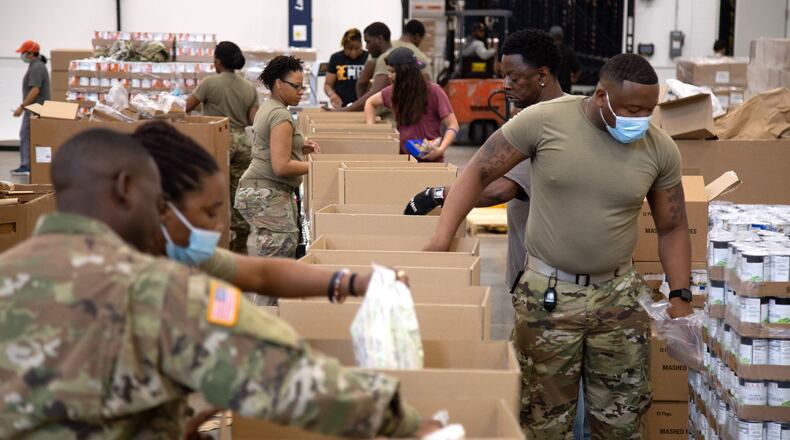“Deploying the National Guard” is a phrase reserved for times of crisis, typically used to address sudden calamities like a large hurricane or tornado.
But the coronavirus pandemic has transformed the Georgia National Guard and dozens of its reserve soldiers into a force fighting a more prolonged and less visible disaster: food insecurity and the rising number of families facing hunger.
Since early April, about 180 soldiers on reserve in Georgia have been mobilized to help food banks across the state. Food bank officials and local pantries say the soldiers have become a critical part of food relief efforts as volunteer numbers dropped due to the virus, though it is unclear how long their deployment will continue.
“It’s a massive level of support for food banks around the country,” said Kyle Waide, the CEO of the Atlanta Community Food Bank. “I think it’s safe to say that there’s not been this kind of national deployment previously.”
About 50 to 60 men and women who are members of the National Guard were assigned to the Atlanta food bank, which serves 29 counties in metro Atlanta and North Georgia. Half of the guardsmen work at the food bank’s new headquarters and packing facility in East Point, while the rest are spread out at food pantries and nonprofits across the region, helping to pack boxes of essential goods and load up cars.
The extra help is especially needed, Waide said, because the food bank’s usually steady volunteer base has been reduced due to the virus. The organization decided to no longer use volunteers at its main facility due to safety concerns, and many older volunteers who typically help out at local food drives are staying at home because they are more vulnerable during the pandemic.
The loss in volunteers hit as the number of people seeking food increased by 30 to 40% due to the pandemic, the food bank estimated.
Atlanta’s food bank worked with the Georgia Food Bank Association to formally request support from the Georgia National Guard through Gov. Brian Kemp’s office in mid-March. Just a few weeks later, soldiers dressed in camouflage were on the front lines of food drives and sorting materials at food banks across the state.
The Georgia National Guard consists of thousands of reserve soldiers who receive military training one weekend a month and over two weeks during the summer. Many hold full-time jobs but can be dispatched to respond to domestic disasters or even deployed overseas.
Waide said the guard has assisted food banks following localized disasters in the past, but never to this extent.
National Guard spokeswoman Maj. Pamela Stauffer said the force has responded to public health crises in the past — like the mass water shortage in the city of Unadilla in 1960 — but never an outbreak similar to COVID-19.
About 2,500 of the Georgia National Guard’s more than 14,000 members are actively deployed across the state. In addition to those at food drives, 100 Georgia guardsmen were called up to sanitize assisted-living facilities and nursing homes with coronavirus cases. They are also in six hospitals across the state and helping school districts provide food to families in need, he said.
Lt. Richard Henry, who works in the admissions department at the University of North Georgia, has only been called up once before, to help with hurricane relief in Florida. Now, he is in charge of dozens of soldiers at the Atlanta food bank’s headquarters.
“I had never done anything with a food bank before,” said Henry, who lives in Roswell.
The soldiers come in around 7:30 a.m. every day and begin sorting through food that is donated to make sure it can be distributed.
“Once it is sorted, then it is repackaged into individual boxes to then be given to families,” he said.
It is unclear just how long the soldiers will remain with the food banks, Henry said. The current orders were extended from the end of May until late June, and officials are assessing whether to continue the deployment, and for how long.
Tom Carden, the adjutant general of the Georgia National Guard, said at a press conference with Kemp last week that soldiers have helped distribute more than 41 million pounds of food though its work with the food banks, equal to more than 21.6 million meals.
“I’m very proud of the men and women and the results that we’ve produced for the citizens of Georgia,” Carden said.
The soldiers are paid for their work, which Henry said has been helpful for some of the guardsmen that found themselves out of a job when the pandemic first hit.
And while it may not be the same as on-the-ground disaster relief, Henry recognizes that the work inside the food bank’s facility is just as important for families struggling to put food on the table.
“It’s been an eye-opening experience for all of us,” Henry said. “It’s been very humbling.”
About the Author
The Latest
Featured






